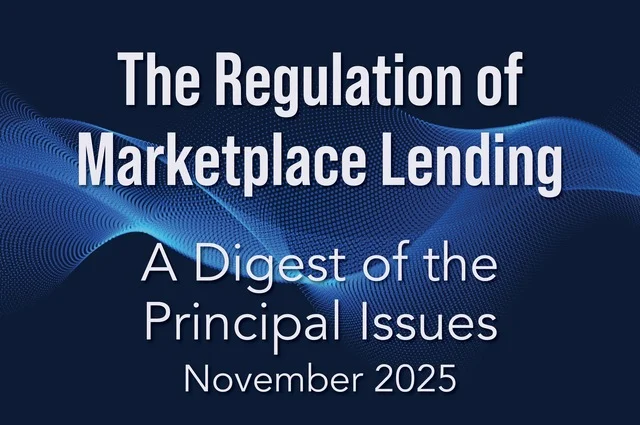- Topic: Investment Advisers
74 matches.
Chapman's quarterly Regulatory Update contains an overview of the latest regulatory actions, market happenings, and litigation and enforcement activity in the investment management space.
The Division of Examinations of the Securities and Exchange Commission published its examination priorities for fiscal year 2025. The 2025 Exam Priorities reflect practices, products, and services the Division believes present heightened risks to investors and the U.S. capital markets.
Chapman's quarterly Regulatory Update contains an overview of the latest regulatory actions, market happenings, and litigation and enforcement activity in the investment management space.
The Investment Advisers Act of 1940 (the “Advisers Act”), rules adopted by the U.S. Securities and Exchange Commission (the “SEC”) pursuant thereto, and state laws governing the activities of investment advisers determine when persons engaged in the business of providing investment advice must or may register as an investment adviser with either the SEC or the relevant state authorities.
Despite recent regulatory efforts from FINRA and the SEC, industry participants continue to have no clear understanding of what qualifies a product as either “complex” or “risky.” In this article, Chapman attorneys provide insight and context for a path forward for definitive guidance regarding complex products, but also for a more rational regulatory scheme that considers a wide variety of factors. This article proposes an objective framework for broker-dealers and investment advisers to consider Defined Outcome ETFs, regardless of whether they are deemed complex under the current regulatory environment, by utilizing a well-established measure of risk to assess whether an investment in those vehicles is in a client’s best interest.
On June 5, 2024, the United States Court of Appeals for the Fifth Circuit (the “Court”) determined to vacate rules recently adopted by the Securities and Exchange Commission (the “Commission”) regulating the conduct of investment advisers to private investment funds (the “Private Fund Advisers Rule”).
On April 23, 2024, the Department of Labor (“DOL”) released its final investment advice fiduciary rule, titled the Retirement Security Rule (the “Final Rule”), which re-defines who is a fiduciary on account of providing investment advice to workplace retirement plans and individual retirement accounts (“IRAs”). In addition, the DOL released several amended DOL prohibited transaction exemptions that, together with the Final Rule, are “intended to protect the interests of retirement investors by requiring persons who are defined in the Final Rule as investment advice fiduciaries to adhere to stringent conduct standards and mitigate their conflicts of interest.” The Final Rule and the amended exemptions finalize the proposed investment advice fiduciary rule and proposed amendments to the prohibited transaction exemptions, which the DOL issued on October 31, 2023. The Final Rule narrows certain provisions in the proposed rule that some commentators and industry groups argued were overly broad. The Final Rule and the amended prohibited transaction exemptions will become effective on September 23, 2024, except that certain provisions in the amended exemptions will not be phased in until one year after such effective date.
Chapman's quarterly Regulatory Update contains an overview of the latest regulatory actions, market happenings, and litigation and enforcement activity in the investment management space.
Chapman's quarterly Regulatory Update contains an overview of the latest regulatory actions, market happenings, and litigation and enforcement activity in the investment management space.
The Securities and Exchange Commission is taking significant steps to combat “greenwashing,” which occurs when a company conveys false or misleading information to overstate its environmental or sustainability practices, as well as other activities the SEC perceives to be potentially misleading to investors with respect to a company’s ESG efforts.
- September 2021Journal of Investment Compliance
The US Securities and Exchange Commission Division of Examinations has released its 2021 Examination Priorities. A discussion of the exam priorities is included in this article.
- LexisNexis Practical Guidance
On April 13, the Department of Labor released guidance on the prohibited transaction exemption pertaining to fiduciary investment advice for retirement investors, employee benefit plans and investment advice providers.
On April 9, 2021, the Securities and Exchange Commission Division of Examinations issued a Risk Alert highlighting observations made by the Division from recent examinations of investment advisers, registered investment companies, and private funds offering products and services that incorporate environmental, social, and governance factors.
The Securities and Exchange Commission’s Division of Examinations has released its 2021 Examination Priorities.
On December 22, the U.S. Securities and Exchange Commission adopted amended Rule 206(4)‑1 under the Investment Advisers Act of 1940, as amended, which addresses investment advisers marketing their services to clients and investors
The Department of Labor proposed a new investment advice fiduciary rule, which generally reinstates the DOL’s longstanding investment advice fiduciary test and provides a new prohibited transaction exemption for such fiduciaries.
With the Form CRS compliance date set for June 30, 2020, the SEC's Office of Compliance Inspections and Examinations recently announced that it would begin conducting examinations focused on Form CRS compliance and outlined the focus of exams likely to occur in the first year following the compliance date.
The SEC has taken several actions to assist funds and advisers in light of the effects of COVID-19. Similarly, FINRA also has taken several actions to provide guidance and certain regulatory relief to its member firms.
The SEC re‑proposed Rule 18f-4, a new exemptive rule designed to provide a more comprehensive approach to the regulation of funds’ use of derivatives and certain other transactions.
The SEC's Office of Compliance Inspections and Examinations has released its 2020 Examination Priorities. This Client Alert includes a discussion of the exam priorities.
On November 4, the SEC announced proposed amendments to Rules 206(4)-1 and 206(4)-3 under the Investment Advisers Act of 1940 to address investment adviser advertisements and payments to solicitors, respectively.
The Securities and Exchange Commission voted 3 to 1 to adopt highly anticipated new and amended rules, forms and guidance relating to registered investment advisers’ and broker-dealers’ conduct and interactions with retail customers.
The beginning of each year provides an opportunity for investment advisers to review compliance and regulatory matters, including issues related to private investment funds and commodity pools.
On December 14, the Securities and Exchange Commission’s Office of Compliance Inspections and Examinations issued a Risk Alert reminding investment advisers of their recordkeeping obligations with respect to electronic messaging and summarizing their related observations from recent examinations.
The Securities and Exchange Commission recently issued a no-action letter which allows broker-dealers to rely on investment advisers to perform some or all of their Customer Identification Program obligations under federal anti-money laundering legislation.
The Securities and Exchange Commission’s Office of Compliance Inspections and Examinations issued a National Exam Program Risk Alert outlining the most common deficiencies that OCIE staff has identified in recent examinations of registered investment advisers’ best execution practices.
On April 18, the Securities and Exchange Commission released a new interpretation addressing investment advisers’ fiduciary duties to their clients. The SEC’s proposed interpretive guidance reaffirms and clarifies duties owed by investment advisers to their clients under Section 206 of the Investment Advisers Act of 1940.
Today, the Securities and Exchange Commission voted 4 to 1 to propose highly anticipated new and amended rules and guidance relating to registered investment advisers’ and broker-dealers’ conduct and interactions with retail customers.
The Securities and Exchange Commission’s Office of Compliance Inspections and Examinations recently published a Risk Alert that highlights frequently-identified investment adviser fee and expense compliance issues from exams of over 1,500 investment adviser examinations during the past two years.
The Securities and Exchange Commission’s Office of Compliance Inspections and Examinations recently released its 2018 National Exam Program Examination Priorities. Highlights from the 2018 exam priorities are reviewed in this Client Alert.
The beginning of each year provides an opportunity for investment advisers to review compliance and regulatory matters, including issues related to private investment funds and commodity pools, which are briefly summarized in this alert.
The staff of the Securities and Exchange Commission issued three no-action letters designed to assist broker‑dealers and investment advisers in addressing issues related to European Union directives and related legislation that will become effective on January 3, 2018.
- Q3 2017 (Originally Published May 4, 2017)Journal of Investment Compliance
The Financial Industry Regulatory Authority, Inc. released additional guidance on social media and digital communications in Regulatory Notice 17-18. The guidance from FINRA is summarized in this article.
The Securities and Exchange Commission’s Office of Compliance Inspections and Examinations recently published a Risk Alert that highlights frequently identified investment adviser advertising compliance issues. The Risk Alert identifies the advertising compliance issues most frequently identified in deficiency letters from investment adviser examinations.
- Q2 2017 (Originally Published February 24, 2017)Journal of Investment Compliance
In February 2017, the staff of the Securities and Exchange Commission’s Division of Investment Management issued guidance providing additional clarity on Rule 206(4)-2 under the Investment Advisers Act of 1940.
The Securities and Exchange Commission announced that it is requesting comments from retail investors and other interested parties on the standards of conduct applicable for broker-dealers and investment advisers.
Labor Secretary Alexander Acosta confirmed in an Op-Ed in the Wall Street Journal that the Department of Labor fiduciary rule will become applicable on June 9. Along with the Op-Ed, the DOL issued new Conflict of Interest FAQs related to the June 9, 2017 to January 1, 2018 transition period and Field Assistance Bulletin No. 2017-2.
The Financial Industry Regulatory Authority, Inc. recently released additional guidance on social media and digital communications. FINRA previously issued guidance on the use of social media communications in Regulatory Notice 10-06 and Regulatory Notice 11-39.
Yesterday the Department of Labor released the final rule delaying the applicability of the DOL fiduciary rule and the related prohibited transaction exemptions to June 9, 2017. The rule was originally set to become applicable on April 10, 2017.
The Department of Labor announced a proposed 60-day delay of the applicability date of the DOL fiduciary rule and related exemptions. The DOL has allowed a 15-day comment period providing all interested parties an opportunity to comment on the proposed delay.
The staff of the Securities and Exchange Commission’s Division of Investment Management recently issued new guidance providing additional clarity on Rule 206(4)-2 under the Investment Advisers Act of 1940.
The staff of the Securities and Exchange Commission’s Division of Investment Management recently released guidance on disclosure, suitability and compliance obligations for automated advisers—often referred to as “robo-advisers.”
The Financial Industry Regulatory Authority, Inc. recently proposed amendments that would create a new exception to FINRA’s prohibition on projecting performance. The proposed exception to FINRA Rule 2210 would permit a firm to distribute a customized hypothetical investment planning illustration.
The Securities and Exchange Commission’s Office of Compliance Inspections and Examinations recently published a Risk Alert listing five compliance topics most frequently identified in deficiency letters to investment advisers following exams.
President Trump issued a memorandum directing the Department of Labor to conduct an analysis of the fiduciary rule’s potential impact. Depending on the results of its examination, the memorandum instructs the DOL to publish for notice and comment a proposed rule to rescind or revise the rule.
The Department of Labor released on January 13 two sets of frequently asked questions to provide additional guidance on its new fiduciary rule. One set of FAQs is directed at consumers to better help them understand the Rule. The other set of FAQs is directed at financial service providers to address the regulation defining “investment advice.”
The Securities and Exchange Commission’s Office of Compliance Inspections and Examinations recently released its Examinations Priorities for 2017.
The beginning of each year provides an opportunity for investment advisers to review annual compliance and regulatory matters, including issues related to private investment funds and commodity pools. This alert briefly summarizes some of the primary issues that advisers might consider in their 2017 annual review and update processes.
The staff of the Securities and Exchange Commission’s Division of Investment Management has released guidance focused on disclosure issues and certain procedural requirements associated with mutual funds implementing intermediary‑specific variations to sales loads and adding new share classes.
The Municipal Securities Rulemaking Board recently published guidance on broker-dealer obligations when executing transactions involving a registered investment adviser that is authorized to exercise full discretion to buy and sell municipal securities on behalf on an account holder.
On October 27, the Department of Labor issued its first wave of FAQs to address certain questions that have arisen with respect to the DOL’s previously issued fiduciary rule. Generally, the Rule broadly defines who is a fiduciary under the Employee Retirement Income Security Act and the Internal Revenue Code.
The Securities and Exchange Commission recently approved new Financial Industry Regulatory Authority, Inc. pay‑to-play rules to regulate activities of FINRA member firms that engage in distribution or solicitation activities with government entities on behalf of investment advisers.
The Securities and Exchange Commission recently adopted changes to certain aspects of the reporting, disclosure and recordkeeping obligations of registered investment advisers including changes to Form ADV.
The Securities and Exchange Commission’s Office of Compliance Inspections and Examinations recently issued a Risk Alert announcing that they will be undertaking an examination initiative focused on the risk that registered advisers may be making conflicted recommendations to their clients.
The Securities and Exchange Commission recently proposed a new rule and rule amendments under the Investment Advisers Act of 1940 that would require SEC-registered investment advisers to adopt and implement written business continuity and transition plans.
The Securities and Exchange Commission recently published a notice of its intention to adjust for inflation dollar amount thresholds for the “qualified client” definition under Investment Advisers Act of 1940 Rule 205-3. Under Rule 205-3, an investment adviser may charge performance-based fees to a “qualified client” meeting a minimum net worth or minimum assets.
This alert addresses several frequently asked questions related to sales of unit investment trusts registered under the Investment Company Act of 1940 by those persons deemed fiduciaries under the U.S. Department of Labor's recently released fiduciary rule.
Today the U.S. Department of Labor released its highly anticipated final rule to define the term “fiduciary” and address conflicts of interest in providing investment advice to retirement accounts.
This Client Alert briefly summarizes some of the primary issues that advisers might consider in their 2016 annual review and update processes.
- Client Alert
The Securities and Exchange Commission’s Office of Compliance Inspections and Examinations recently released its Examinations Priorities for 2016. Firms should review their policies, procedures and business activities in light of OCIE’s stated 2016 priorities.
- Client Alert
The Securities and Exchange Commission’s Office of Compliance Inspections and Examinations recently issued a Risk Alert providing information on the areas of focus for the SEC staff’s second round of cybersecurity examinations of registered investment advisers and broker-dealers.
- Client Alert
The Financial Crimes Enforcement Network recently proposed rulemaking to prescribe minimum standards for anti-money laundering programs.
- Client Alert
The Securities and Exchange Commission recently set the compliance date for the ban on certain payments to third-party solicitors under Rule 206(4)-5 of the Investment Advisers Act of 1940 as July 31, 2015.
- Client Alert
The staff of the Securities and Exchange Commission’s Division of Investment Management recently published guidance on investment adviser Code of Ethics exceptions to personal securities transaction reporting for securities transactions occurring in certain types of trusts or investment management accounts where the beneficiary or account holder has limited or no discretionary investment authority.
- Client Alert
This Client Alert summarizes the Securities and Exchange Commission proposed changes to certain aspects of the reporting, disclosure, and recordkeeping obligations of registered investment advisers.
- Client Alert
On May 20, 2015, the Securities and Exchange Commission proposed changes to certain aspects of reporting and disclosure obligations of registered investment advisers and investment companies.
- Client Alert
The staff of the Securities and Exchange Commission’s Division of Investment Management recently published guidance for registered investment advisers and registered investment companies related to cybersecurity preparedness in their business practices.
The staff of the Securities and Exchange Commission recently issued guidance to remind affiliates of registered investment companies that the receipt of gifts or entertainment may violate Section 17(e)(1) of the Investment Company Act of 1940.
The Securities and Exchange Commission’s Office of Compliance Inspections and Examinations recently issued its 2015 Regulatory and Examinations Priorities Letter.
The Securities and Exchange Commission recently issued a no-action letter which grants relief to broker-dealers, allowing them to rely on investment advisers to perform some or all of their Customer Identification Program obligations under federal anti-money laundering legislation.
- Client Alert
The beginning of each year provides an opportunity for investment advisers to review annual compliance and regulatory matters, including issues related to private investment funds and commodity pools.
- Client Alert
If your firm is a registered investment adviser that has never been examined by the Securities and Exchange Commission, you might want to prepare to see SEC examiners in the near future.
- Client Alert
The Commodity Futures Trading Commission (the “CFTC”) recently issued final rule changes:
• narrowing the exclusion from the definition of commodity pool operator (“CPO”) available to mutual funds and other registered investment companies (“RICs”) and their advisers;
• eliminating an exemption from CPO registration available to private fund operators (but keeping another exemption that had also been proposed to be eliminated);
• narrowing and rescinding certain exemptions from commodity trading advisor (“CTA”) registration;
• adding certain risk disclosure statements for CPOs and CTAs with respect to swaps; and
• making certain changes to reporting and certification obligations for entities required to register as CPOs and
• CTAs and entities relying on exclusions and exemptions from registration.
- Client Alert
The Dodd-Frank Wall Street Reform and Consumer Protection Act (the “Dodd-Frank Act”) requires the Securities and Exchange Commission (“SEC”) to conduct a study of legal and regulatory requirements applicable to broker-dealers, investment advisers, and associated persons who provide personalized investment advice and recommendations about securities to retail customers.






